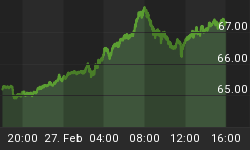The vast majority of economists now say that the recession is over. Many expect nominal GDP growth as high as four percent in 2010. Now, with the economy assumed to be back on stable footing, some in the private sector are starting to talk about inflation.
While agreeing that growth has returned, the Federal Reserve and the Obama administration do not see inflation as a threat. To them, the political costs of ongoing recession far outweigh any medium-term considerations about the value of the dollar, hence their determination to hold short-term interest rates to around zero. This has created unnatural conditions in the U.S. Treasury market and is limiting the prospects for real growth.
The Fed lending at zero enables the major banks to invest in long-term Treasuries at a huge risk-free spread of nearly four percent. In addition, the Fed is - for the first time - paying interest on bank reserves deposited with the Fed. In such a 'la-la' world, why would any bank take the needless risk of lending to small businesses, the main creators of new jobs? For all but the largest corporations, who can also access the bond markets directly, credit is tight. The lack of private-sector bank liquidity has hurt job creation, consumer demand, and is adding mightily to recessionary pressures.
What's worse, this monetary treadmill has disrupted market signals about coming inflation.
When the vast sums lent to the banks are recycled back to the government, the money remains exclusively a part of the monetary base, but never enters the money supply. Only when the banks are induced to lend to the real economy does the 'rescue' money flood into the market and drive up consumer prices.
Currently, inflation appears low. But if the Fed decides to raise interest rates, the risk-free trade between the short end and long end of the yield curve will be eliminated. At that point, banks will have to start lending to small business and to individuals. The whole inflation picture will be changed dramatically.
More importantly, what if Bernanke is not fully in control of interest rates? For instance, as investors grow wary of growing federal deficits, the potential for high inflation, and the looming probability that the Fed will raise rates, they may exert selling pressure, particularly at the long end of the yield curve. Indeed, with some four percent yield differential between short and long Treasuries, the curve is steeper than it has been for years. This selling pressure could force Bernanke to raise short-term rates.
Evidence of increasing inflation could also drive Bernanke to raise interest rates before he plans to do so. If the Fed is compelled follow such a course, several things are likely to occur.
First, there would be a rapid sell-off in overpriced long-dated Treasuries. This would be the 'bond market crash' that we have long envisaged.
Second, American equities will likely experience downward pressure as the discount rate, used to assess the present value of dividends, rises.
Third, a rise in interest rates could trigger a crisis in interest rate-dependent derivatives held by banks, similar to circumstances of the last credit crisis.
Finally, and most concerning, higher rates would increase the debt burden for the U.S. government, which is increasingly sold in short-term notes. With a stagnating economy, the tax base will be unable to shoulder this extra weight. This could potentially lead to the largest sovereign default in history.
Many commentators are arguing that hyperinflation cannot happen in the midst of a second credit crisis. In fact, hyperinflation tends to happen in rapidly contracting economies: Zimbabwe, Weimar Germany, Argentina. These countries have negative productivity growth and thus cannot 'soak up' the excess currency being printed to keep prices stable.
Based on his perceived diagnosis of the Great Depression, Bernanke is betting the house on his War on Recession. Despite the media's faith that he has an ace up his sleeve, it is a foolhardy gamble with the country's economic future.
For a more in-depth analysis of our financial problems and the inherent dangers they pose for the U.S. economy and U.S. dollar, read Peter Schiff's 2008 bestseller "The Little Book of Bull Moves in Bear Markets" and his newest release "Crash Proof 2.0: How to Profit from the Economic Collapse." Click here to learn more.
More importantly, don't let the great deals pass you by. Get an inside view of Peter's playbook with his new Special Report, "Peter Schiff's Five Favorite Investment Choices for the Next Five Years." Click here to dowload the report for free. You can find more free services for global investors, and learn about the Euro Pacific advantage, at www.europac.net.















